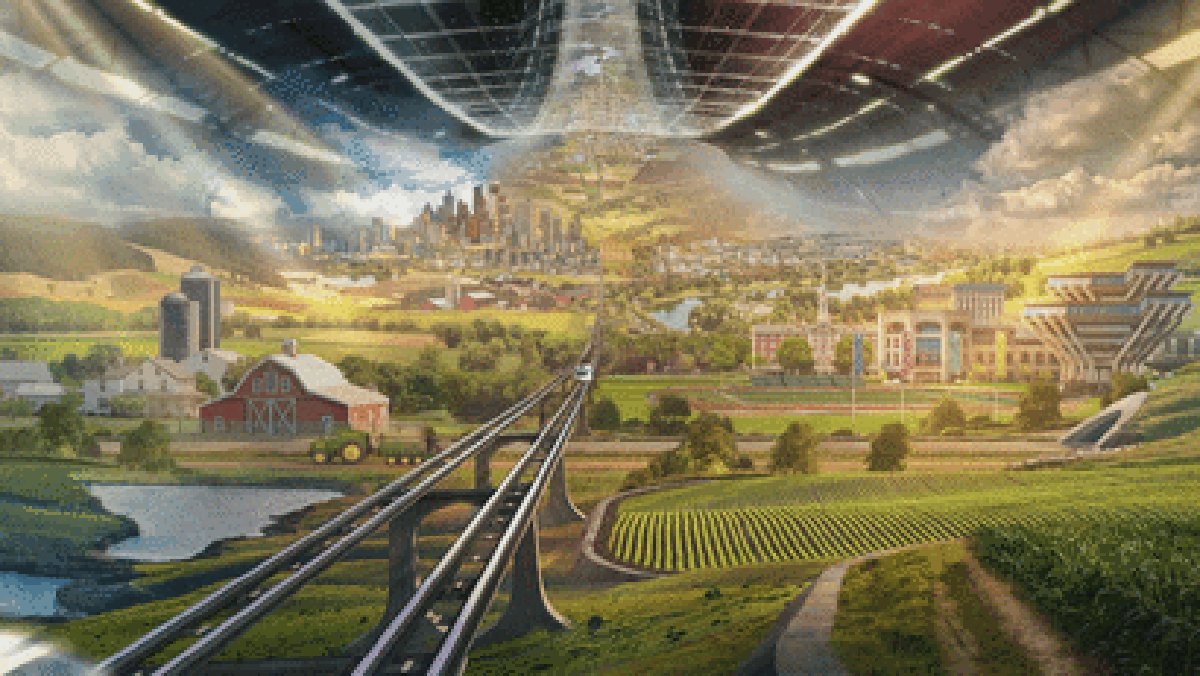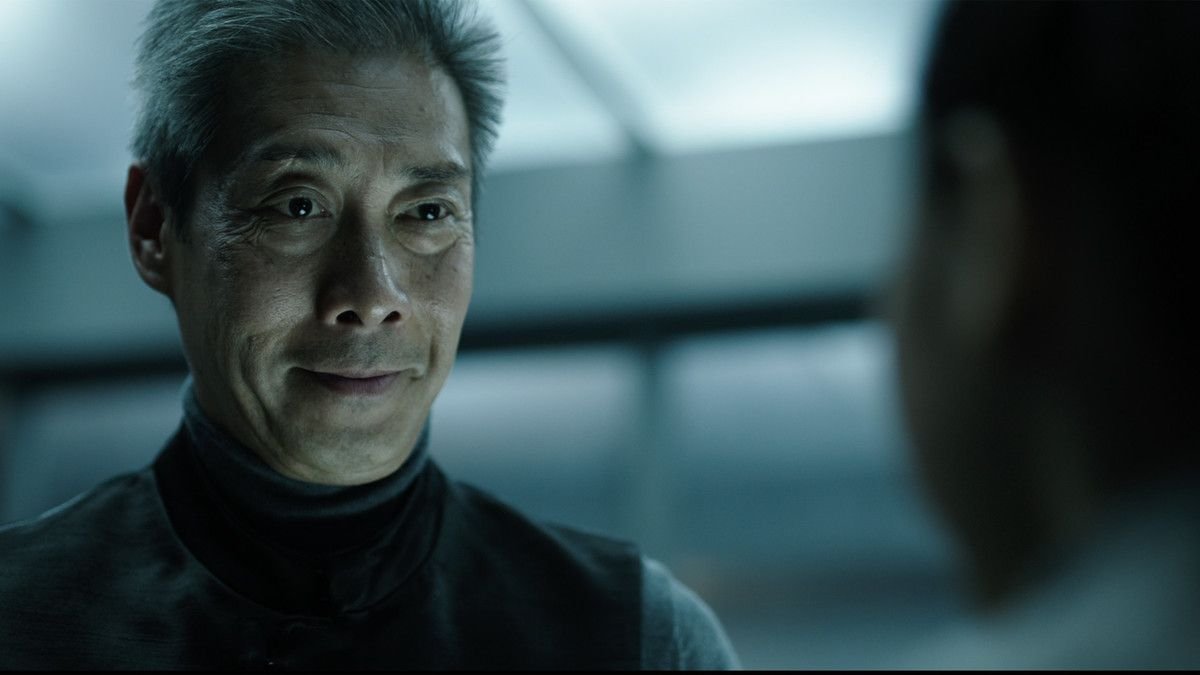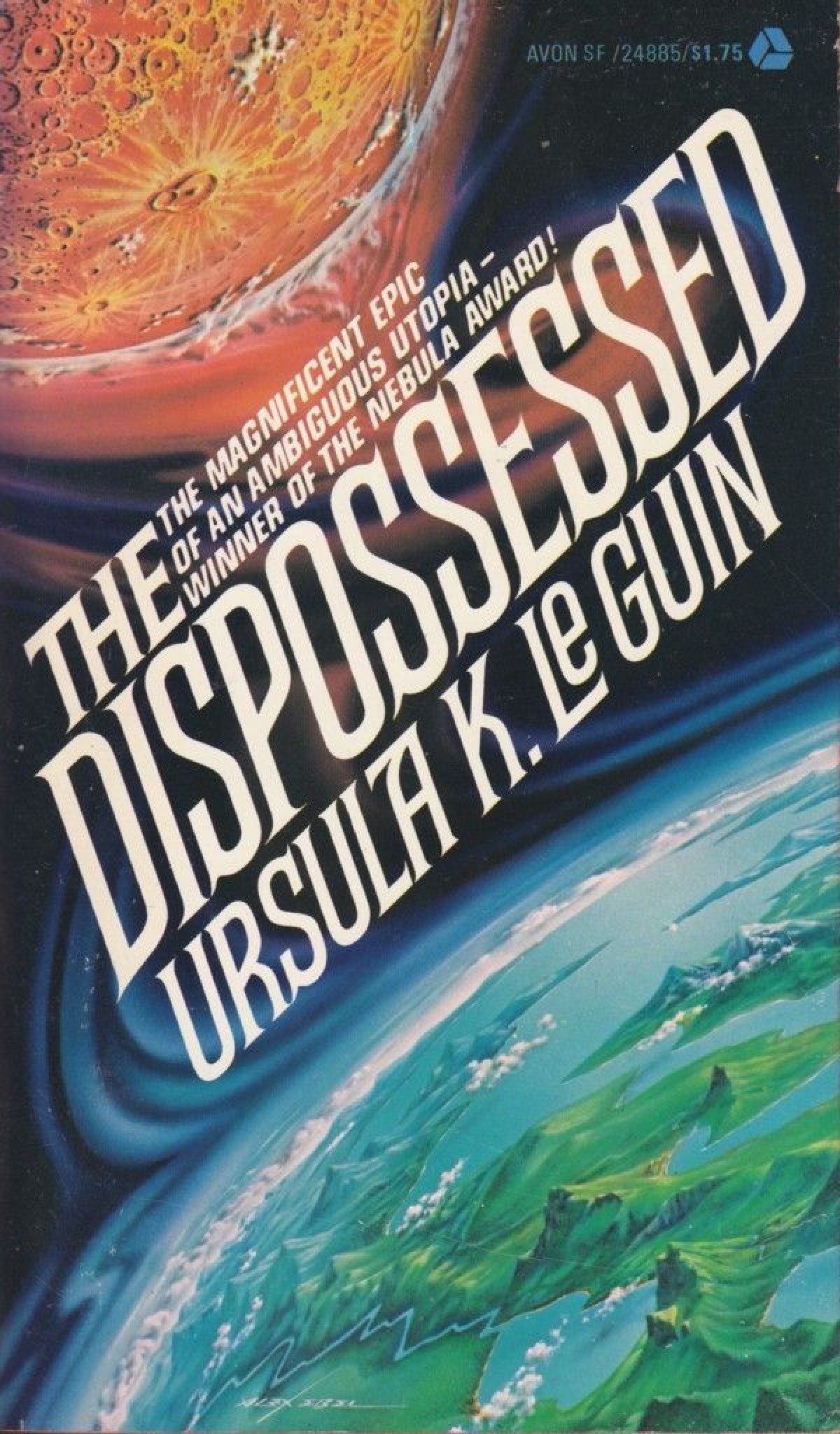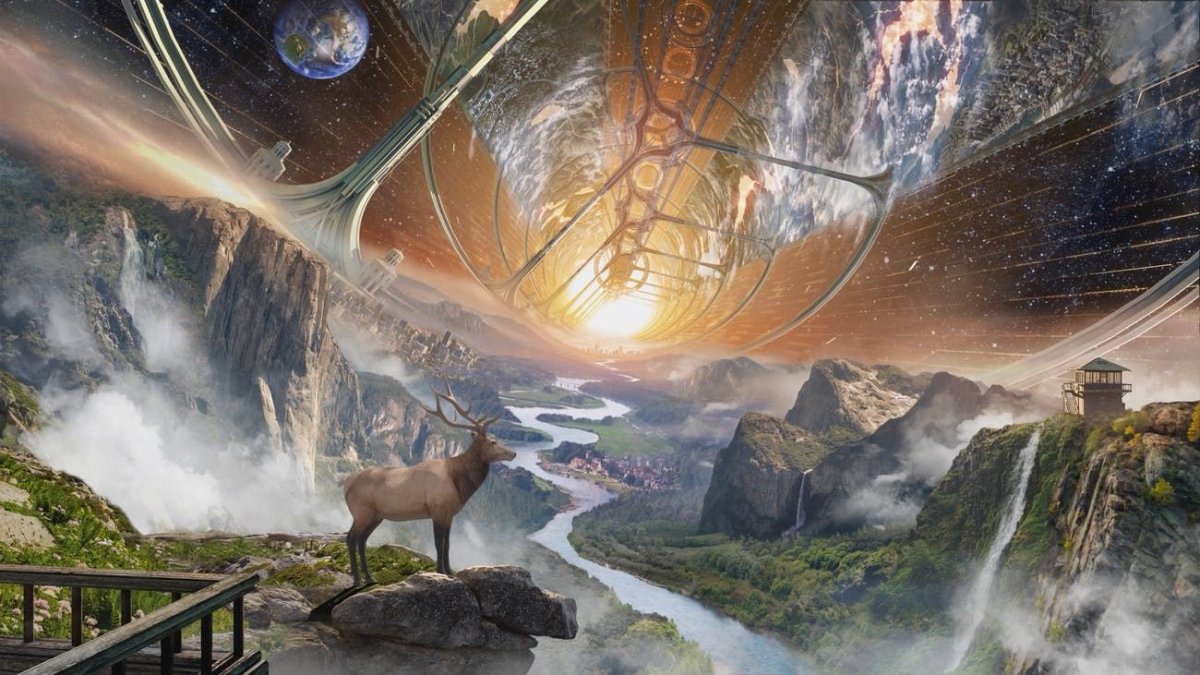In a Thursday presentation, Amazon founder and CEO Jeff Bezos unveiled a lunar lander and announced plans, not just for a return to the moon by 2024—"this time to stay," Bezos said—but also a utopian vision for the human colonization of space, retasked from the 1970s work of physicist Gerard K. O'Neill. Anchored in hardware, including a lunar rover (designed to stack four at a time atop the showcase lunar lander) and the chrome skeleton of a BE-7 thruster, Bezos tasked his rocket company Blue Origin with building the infrastructure for subsequent generations to fully exploit space.
"We're going to build a road to space. And then, amazing things will happen," Bezos said. The same causality is echoed throughout the bluntly named "Going to Space to Benefit Earth" event, which intentionally left the messy middle out of the generations between Blue Origins' current plan, re-accomplishing the moon missions of 1969 to 1972, and Bezos' distant ambition: spectacular space platforms housing a trillion humans.
Jeff Bezos Presents Blue Moon at "Going to Space to Benefit Earth" Event
The idea is premised on O'Neill's answer to the question "Is the surface of a planet really the right place for an expanding technological civilization?" No, O'Neill answered, beginning in 1970 with his paper "The Colonization of Space."
Instead, O'Neill and his students designed self-sustaining space environments, which could be populated close to Earth, in the habitable orbital band already conducive to life.
We have, as Isaac Asimov asserts and Bezos echoes (in one of many shout-outs to the thought leaders of science and science fiction), been "planetary chauvinists" in our thinking. Spun up to centrifugal gravity and holding, in a glass cylinder, miles-long slabs of land, each artificial world would hold a million people. Inside are tropical garden cities, farmlands, imported European towns, even a Rockwellian high school with football field. Or, in another piece of science-fictional concept art, an endless wilderness, refuge and tourist attraction in one.

Bezos doesn't claim to have the map from the present to this future. "How, really, are we going to build O'Neill colonies?" Bezos asked. "Nobody knows. I don't know. Nobody in this audience knows. That's for future generations to figure out the details."
Bezos deliberately elided the many steps between today and O'Neill colonies to narrow Blue Origin's mission to engineering obstacles, specifically the "two gates" standing between us and a spacebound future.
"First, we must have a radical reduction in launch cost," Bezos explained. "And second, we have to use in-space resources."
This makes the presentation itself the real technology on offer, engineered to fix a cylindrical future in the public imagination, particularly with the young people who will provide the only mechanism of progress Bezos contemplated in the presentation: "entrepreneurial creativity."
His repeated invocations of entrepreneurialism, including that Silicon Valley classic, "space entrepreneurs start a company in their dorm room," outline a preferred pathway. Getting to this future, we learn, will be a lot like founding Amazon. Bezos even ended the presentation with a photo of himself, working in the office where Amazon.com was first launched. "Big things start small," he said, before walking off the stage.
Bezos has long described himself as a science fiction fan, particularly of Star Trek. He reads Alastair Reynolds (Pushing Ice), Ernest Cline (Ready Player One) and Andy Weir (The Martian). There's no mistaking the overwhelming science-fictional ambition O'Neill cylinders represent, with Bezos depicting a future in the same spirit as NASA's own 1970s efforts at farsight, remembered most in images of space colonies by NASA illustrators like Rick Guidice and Don Davis—both obvious influences on Bezos' concept art.
Honestly shocked that @JeffBezos hasn’t found a way to own these originals (Artist Depiction by Don Davis & Rick Guidice) pic.twitter.com/oWqz1rWgA4
— Artist Depiction | A Documentary Series (@ArtistDepiction) May 10, 2019
But some of sci-fi's most productively provocative futures also complicate Bezos' entrepreneur-driven utopianism, beginning with a show it's almost certain the Amazon founder has watched, since he bought it: The Expanse, which will premiere its fourth season on Amazon Prime Video this year.
Blue Moon and The Expanse
Since the day he personally announced its renewal at a National Space Society event, Bezos has worked to associate his rocket company with the multiplanetary future of The Expanse, based on a series of novels by Daniel Abraham and Ty Franck, writing under the joint pseudonym James S.A. Corey. The Expanse cast and writers have reciprocated, spreading the news of Blue Origin's Blue Moon lunar program. Here's Cas Anvar, who plays the ace pilot of the Rocinante Alex Kamal on The Expanse:
ALL I know is someone's gotta pilot that puppy. 🤠🚀 #Luna2024 @JeffBezos @ExpanseOnPrime @blueorigin https://t.co/uSgXDao2OH
— Cas Anvar (@Casanvar) May 10, 2019
But Bezos might want to pay closer attention to the future The Expanse posits, or else be content to reproduce it. In The Expanse, humanity has spread from Earth to the moons of Jupiter, with the United Nations of Earth, an independent Mars and the loose confederation of asteroid and space station-bound "Belters" standing in for the jockeying nation-states of today.
Technology in The Expanse isn't presumptively beneficial to all, but a volatile force that reshapes the terms of conflict between human institutions fighting for their material interests. Heinous violations of autonomy and dignity become possible when there is no planetary commons, leading to uniquely spaceborne forms of exploitation. It's hard to win a labor strike when your employers control the very air. Like the corporate oligarch Jules-Pierre Mao (Francois Chau), Bezos would be a faction unto himself on The Expanse, and a dangerous one.
I think we all know how this plays out... https://t.co/yfln2iwDGI
— The Expanse (@ExpanseOnPrime) May 9, 2019
The future of The Expanse dramatizes many of the dark portents read into Bezos and his billionaire peers, including Elon Musk's SpaceX and Richard Branson's Virgin Galactic, who are fixing their eyes on space just as thorough climate science outlines decades of poverty, mass species extinction, famine and refugee crises.
Articles like The Guardian's "How tech's richest plan to save themselves after the apocalypse" and our own "Star Wars Class Wars" have become a microgenre, outlining the ways the global rich, whose floating capital will never chain them like other climate victims, are preparing to pull up the ladder and keep the rabble out.
This class struggle depicted in The Expanse doesn't require disbelieving the Amazon founder's paradisal intent for humanity. "These are really pleasant places to live," Bezos said of his O'Neill colonies. "This is Maui on its best day, all year long." But it does center what Bezos sets aside.
"We have to realize that there are immediate problems, things that we have to work on. And we are working on those things," Bezos said, in his one concession to the immediate material concerns often weighed against the costs of space programs. "I'm talking about poverty, hunger, homelessness, pollution, overfishing in the oceans, this is a very long list of urgent, immediate problems. And we need to work on those things, urgently, in the here and now. But, there are also long-range problems. And we need to work on those too."
The Expanse argues Earth's problems are inextricable from an extraplanetary humanity. Colonizing space without redress would recreate and magnify them across vast distances and populations.

"We can have a trillion humans in the solar system," Bezos said in his presentation. "Which means we could have a thousand Mozarts and a thousand Einsteins. This would be an incredible civilization."
His words also evoke an essay by evolutionary biologist Stephen Jay Gould, which laments a loss of potential Einsteins to the "near certainty that people of equal talent have lived and died in cotton fields and sweatshops." How many Mozarts and Einsteins are urinating in bottles in a far corner of an Amazon warehouse, unable to find purchase in an economy built to funnel vast rewards to a narrow slice of the population? In space, The Expanse shows, those Mozarts and Einsteins are even easier to squish.
Or at least underutilize, like the main characters of The Expanse, the blue collar crew of the Rocinante, who find themselves at the center of systemwide politics after an extraordinary set of circumstances pull them from their lives of mega-corporate drudgery. Bezos imagines a future built by the singular—Mozarts and Einsteins emerging from dorm rooms with the next big idea—but The Expanse asks what happens when the traditionally disempowered are handed the controls instead.
Bezos Capitalism vs. Luxury Space Communism
While The Expanse exposes the tensions complicating a future built by the entrepreneurial class, science fiction can accomplish even more than modeling today's tensions across theoretical futures. In novels like The Dispossessed and her novella The Word for World is Forest, the late science fiction grandmaster Ursula K. Le Guin imagines radically different societies, built of different assumptions than the Bezos future.
The Dispossessed is set on two neighboring planets, the capitalist Urras, which is much like our world, and Anarres, where a breakaway society lives off the precepts of anarchist and communist thinkers like Peter Kropotkin and Paul Goodman. Science-fictionalized as Odonian separatists, the society built on Le Guin's Anarres works on principles Bezos denounces in his survey of future space colonization.

"What happens when unlimited demand meets finite resources? The answer is incredibly simple: rationing," Bezo said. "That's a bad path. There's good news. The good news is: If we move out into the solar system, for all practical purposes, we have unlimited resources. So, we get to choose: do we want stasis and rationing, or do we want dynamism and growth? This is an easy choice."
It's not such an easy choice in The Dispossessed, which refuses both consumer demand as a universal constant and the conflation of endless economic growth with human dynamism. Where Bezos assumes a future shaped by the same market forces that built Amazon, Anarreans practice horizontal decision making, shared between syndicates and other community-organized economic participants.
Even if Bezos is right that the exploitation of space will provide us unlimited resources, allowing us to "off-planet" pollution and resource-extraction—Bezos imagines an Earth "zoned residential and light industry"—the path he describes to this future surrenders the intervening years to climate change disaster, the inevitable result of pursuing an endless growth model on a finite planet.
Climate change goes pointedly unmentioned in Bezos' list of Earth's "immediate problems," since Bezos calls on the same economic forces destroying the planet to furnish his future, implicitly rejecting limitations like the nearly expended carbon budget between us and what David Attenborough described at a United Nations Climate Summit as "the collapse of our civilizations and the extinction of much of the natural world." The best humanity can hope for in the years before mass emigration to O'Neill colonies is mitigation, since Bezos assumes human consumption cannot, and must not, be in any way curtailed.
But science fiction is replete with societies built on other economic systems than profit motive, from the AI-driven socialism of Iain Banks' Culture series (Consider Phlebas, Use of Weapons) to the voluntary, factional "Hives" of Ada Palmer's Terra Ignota series (Too Like the Lightning, Seven Surrenders). Whether or not The Dispossessed presents a workable model of a human future, it and other sci-fi societies reveal the Bezos vision as contingent on limiting our imagination to technological wonders, assuming that the same economic models that have ravaged Earth's resources and environments must necessarily be reproduced in outer space.
While Le Guin and other science fiction utopias, Bezos' beloved Star Trek included, begin with societies spiritually or philosophically free of the world market monoculture (like the Athsheans of The Word for World is Forest, who fight for equilibrium with nature against the galaxy-scale machinery of human industry—think Avatar, but less blue), science fiction by writers like Kim Stanley Robinson also perform the difficult analytical work of social transformation.
In books like 2015's Aurora and his landmark Mars trilogy (Red Mars, Green Mars, Blue Mars), Robinson grapples with the imposing obstacles to human space colonization, ultimately concluding, in both his novels and essays like " Our Generation Ships Will Sink," that what he calls "this awesome diaspora" simply can't be done, thanks to "physical, biological, ecological, sociological, and psychological" obstacles to populating other planets and stars.
The O'Neill platforms of Blue Origin's spacefaring future are likely a direct answer to many of Robinson's points, by centering human space colonization around Earth and dismissing Mars or other planetside options because of their logistical and gravitational limitations. Both Robinson and Bezos agree that the fate of humanity is likely forever tied with Earth. "There is no Planet B," Robinson wrote in 2016, in words later echoed by Bezos.
But while Bezos takes to heart Robinson's critique of generation ships and extraplanetary terraforming, his O'Neill colony vision would also benefit from the expansive imagination and rigor Robinson brings to fictional futures beyond capitalism. His work takes utopianism seriously in a way Bezos doesn't.
"Why couldn't we put into our economy what everybody needs and then send out to the factories and to the fields and then create what everybody needs and then distribute it back out to where everybody needs, without a market?" Robinson asks in a 2019 interview on The Antifada podcast, envisioning quantum computing colonizing the economy and addressing the market's systematic devaluation of people and the environment. "The problem has to be solved here. Capitalist accumulation is physically impossible at a certain point, and we've reached that point."
In the same interview Robinson even mirrors the Bezos gateways, to radically different ends. "If you had a hundred reforms in a row that you could write up as legislation and enact, one law after the next, to get from where we are now to a perpetual mobile of ecological circulation, with humans fitted into this biosphere on this one and only planet, what would those hundred steps be?" Robinson asks. "The Green New Deal is a fabulous start on this."
Bezos's concept art for an O'Neill cylinder "national park" best illuminates how Robinsonian utopianism won't be optional, even in the Bezos utopian future.

More than the technology itself, it is this park, where no clear profit can be made, which exists without economic justification at unimaginable expense, that's the hardest to believe moment from Bezos' "Going to Space to Benefit Earth" event. It is a beautiful and heartening vision, but one that's hard to imagine coming from the economic inevitability Bezos describes as the engine of this future. If the system Bezos and Amazon exemplifies won't preserve the environment or secure universal human dignity here on Earth, where it's much easier, than why should we assume, as Bezos does, that we'll solve those problems in space, where it's hard?
Science fiction offers endless other rebuttals, enhancements and complications to the future Bezos shared on-stage. In Octavia Butler's Parable of the Sower, a young woman builds a more human-scale space utopianism—the invented religion of Earthseed—out of the climate-wracked ruins of a collapsed American state. In Paolo Bacigalupi's The Windup Girl and series like N.K. Jemisin's Broken Earth, science fiction authors model the possible social effects of ecological catastrophe. Or there's John M. Ford's Star Trek: How Much for Just the Planet, which isn't really applicable, but does end with Captain James T. Kirk getting in a pie fight with Klingons.
"The Earth is no longer big, humanity is big," Bezos said on Thursday. We are bigger than entrepreneurialism too, with imaginations capable of more than Bezos credited at the "Going to Space to Benefit Earth" event —a collective power which must be employed when humans colonize space, or else Bezos might find himself the architect of a grand, cosmic dystopia instead.
Uncommon Knowledge
Newsweek is committed to challenging conventional wisdom and finding connections in the search for common ground.
Newsweek is committed to challenging conventional wisdom and finding connections in the search for common ground.
About the writer
To read how Newsweek uses AI as a newsroom tool, Click here.








